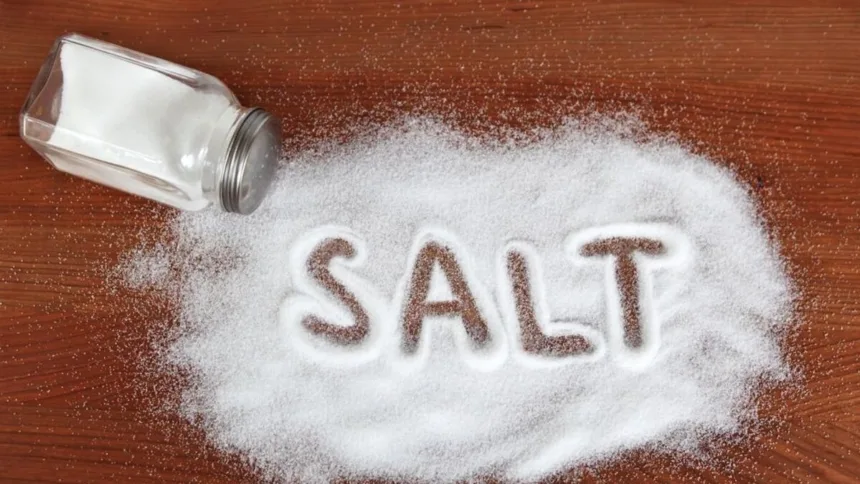Salt is an essential component of our diet since it improves food flavor and is necessary for many body processes. However, as the World Health Organization (WHO) has noted, consuming too much salt can have serious health consequences. Although sodium, a major component of salt, is necessary for good health, excessive use of it can be harmful.
It’s critical to moderate salt intake if you want to stay healthy. Salt raises the risk of numerous significant health disorders, even though it is essential for many biological processes, such as fluid balance and nerve communication. A high salt diet is closely associated with elevated blood pressure, which raises the risk of heart disease, stroke, and kidney damage.
Lowering the risk of high blood pressure development is one of the main advantages of limiting salt intake. Consuming too much salt can make the body retain water, which raises blood volume and strains the heart and blood vessels more. People can better control their blood pressure and lower their risk of cardiovascular diseases including heart disease and stroke by consuming less salt.
Lowering salt intake also helps to strengthen the heart. Hypersaline diets can cause fluid retention, which strains the heart and may cause heart failure. Reducing salt intake eases this burden, promoting heart health in general and lessening the chance of heart-related problems.
The preservation of renal function is yet another important benefit of reducing salt intake. Overconsumption of salt can exert excessive strain on the kidneys, potentially causing harm and reduced performance over time. People can contribute to the preservation of kidney health and the continued proper operation of these essential organs by limiting their consumption of salt.
Cutting less on salt can also help prevent osteoporosis. Increased calcium output in urine is linked to high salt consumption, which may erode bones and exacerbate osteoporosis.
Apart from these advantages, cutting less on salt can help your digestive system function better. Consuming too much salt can make diseases like gastritis and gastroesophageal reflux disease worse and has been related to a higher risk of stomach cancer (GERD). Reducing salt intake can help reduce these dangers and support improved digestive health.
Reducing salt can also help with weight management. Salt is a common ingredient in processed and high-calorie meals, which can lead to weight gain and obesity. People can better regulate their weight and general health by choosing fresh, less processed meals with less salt.
Reduce the risk of high blood pressure
Overindulging in salt can lead to hypertension, which in turn can aggravate renal, heart, and stroke conditions. In this case, cutting back on salt will help you manage your blood pressure and lower your chance of developing these dangerous illnesses.
Improve heart health
Consuming excessive amounts of salt can lead to fluid buildup in the circulation, which can put more strain on the heart and perhaps induce heart failure. Lowering salt intake in this case can assist in lessening the strain on the heart and enhancing general heart health.
Reduce the risk of stroke
Stroke risk is significantly increased by high blood pressure, which is frequently brought on by consuming too much salt. Lowering salt consumption can also lower the chance of stroke.
Improve kidney function
Consuming excessive amounts of salt can strain the kidneys, which over time may cause damage to the kidneys and a decline in renal function. Lowering salt intake can enhance renal function and health.
Protect against osteoporosis
Some studies suggest that eating too much salt may increase calcium excretion in the urine, which may reduce bone density over time. In such a situation, if you eat less salt, you can help protect yourself from osteoporosis.
Better digestive health
The risk of stomach cancer is increased by excessive salt consumption. Additionally, certain digestive disorders including gastritis or gastroesophageal reflux disease (GERD) may experience worsening of their symptoms. Eating less salt in this case can help prevent these dangers and symptoms.
#Jaggery Tea Benefits: Weight Loss and Pain Relief#tea #TeaTime #foodlover #FoodSafety #weightloss #weightlossjourneyhttps://t.co/0bEAV3ZaIq via @TIMELESS NEWS NOW
— Timeless News Now (@timelessnewsnow) August 27, 2024Helpful in weight loss
Salt content is frequently high in processed and high-calorie meals, which can lead to weight gain and obesity. In this case, eating more fresh and less processed food will help you maintain weight management while reducing salt intake.






